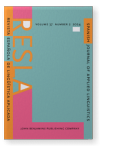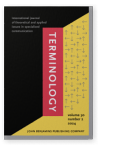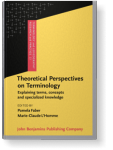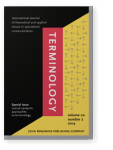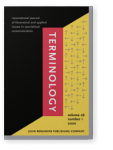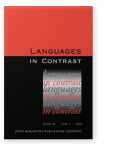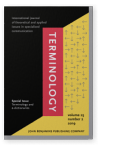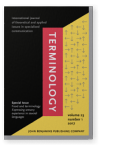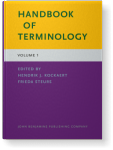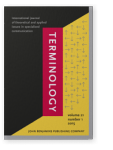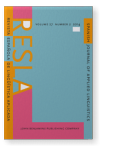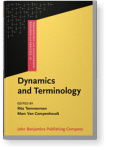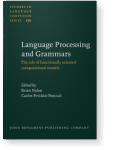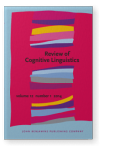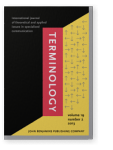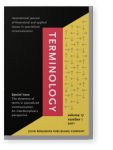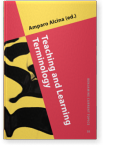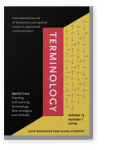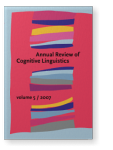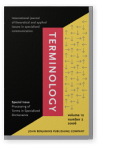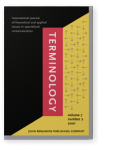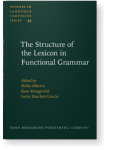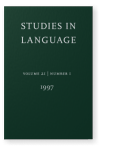Pamela Faber
List of John Benjamins publications for which Pamela Faber plays a role.
Journals
Titles
Theoretical Perspectives on Terminology: Explaining terms, concepts and specialized knowledge
Edited by Pamela Faber and Marie-Claude L'Homme
[Terminology and Lexicography Research and Practice, 23] 2022. vii, 598 pp.
Subjects Applied linguistics | Lexicography | Terminology
Lexical semantic approaches to terminology
Edited by Pamela Faber and Marie-Claude L'Homme
Special issue of Terminology 20:2 (2014) v, 161 pp.
Subjects Lexicography | Terminology
2022 Chapter 16. Frame-based Terminology Theoretical Perspectives on Terminology: Explaining terms, concepts and specialized knowledge, Faber, Pamela and Marie-Claude L'Homme (eds.), pp. 353–376 | Chapter
This chapter develops the theoretical premises and the semantic, syntactic, and pragmatic microtheories underlying Frame-Based Terminology and the organization of specialized knowledge. It also explains how these premises have been implemented to formulate terminological definitions, model… read more
2022 Theoretical perspectives on Terminology: An introduction Theoretical Perspectives on Terminology: Explaining terms, concepts and specialized knowledge, Faber, Pamela and Marie-Claude L'Homme (eds.), pp. 1–12 | Chapter
2020 Who stole what from whom? A corpus-based, cross-linguistic study of English and Spanish verbs of stealing Languages in Contrast 20:1, pp. 107–140 | Article
Drawing on the Lexical Grammar Model, Frame Semantics and Corpus Pattern Analysis, we analyze and contrast verbs of stealing in English and Spanish from a lexico-semantic perspective. This involves looking at the lexical collocates and their corresponding semantic categories that fill the… read more
2019 EcoLexicon and by-products: Integrating and reusing terminological resources Terminology and e-dictionaries, Alcina, Amparo, Rute Costa and Christophe Roche (eds.), pp. 222–258 | Article
Reutilization and interoperability are major issues in the fields of knowledge representation and extraction, as reflected in initiatives such as the Semantic Web and the Linked Open Data Cloud. This paper shows how terminological resources can be integrated and reused within different types of… read more
2017 Food terminology as a system of cultural communication Food and terminology: Expressing sensory experience in several languages, Temmerman, Rita and Danièle Dubois (eds.), pp. 155–179 | Article
In this study on food terminology and culture, Frame-based Terminology Theory (FBT) (Faber 2012, 2015) was combined with corpus analysis to explore the use of culture-specific terms in the food categories of bread and rice. For the sake of comparison, semplates (Levinson and Burenhult 2009;… read more
2015 Frames as a framework for terminology Handbook of Terminology: Volume 1, Kockaert, Hendrik J. and Frieda Steurs (eds.), pp. 14–33 | Chapter
Terminology work involves the collection, analysis and distribution of terms. This is essential for a wide range of activities, such as technical writing and communication, knowledge acquisition, specialized translation, knowledge resource development and information retrieval. However, these… read more
2014 Distintos enfoques al traducir y su efecto en el receptor Revista Española de Lingüística Aplicada/Spanish Journal of Applied Linguistics 27:2, pp. 297–322 | Article
The objective of this study was to determine how the translation approach adopted in an elementary reading text affected its reception by a group of primary school children. Also studied was the impact that the translation approach used had on reading motivation. The three approaches were the… read more
2014 Lexical semantic approaches to terminology: An introduction Lexical semantic approaches to terminology, Faber, Pamela and Marie-Claude L'Homme (eds.), pp. 143–150 | Article
2014 7. Specialized knowledge dynamics: From cognition to culture-bound terminology Dynamics and Terminology: An interdisciplinary perspective on monolingual and multilingual culture-bound communication, Temmerman, Rita and Marc Van Campenhoudt (eds.), pp. 135–158 | Article
This chapter examines the multidimensional representation of specialized concepts and concept systems within the context of new theories of simulated cognition and culture-bound terminology. According to the premises of Frame-based Terminology (Faber et al. 2005; Faber et al. 2006; Faber et al.… read more
2014 Deep semantic representation
in a domain-specific ontology: Linking EcoLexicon to FunGramKB Language Processing and Grammars: The role of functionally oriented computational models, Nolan, Brian and Carlos Periñán-Pascual (eds.), pp. 271–296 | Article
EcoLexicon is a frame-based visual thesaurus on the Environment that is gradually evolving towards the status of a formal ontology. For this purpose, the information in its relational database is in the process of being linked to the ontological system of FunGramKB, a multipurpose knowledge base.… read more
2014 A functional and constructional approach for specialized knowledge resources Language Processing and Grammars: The role of functionally oriented computational models, Nolan, Brian and Carlos Periñán-Pascual (eds.), pp. 297–312 | Article
This paper describes how verbs are represented in EcoLexicon (ecolexicon.ugr.es), a specialized knowledge resource in environmental science. Based on the hypothesis that human cognition organizes concepts in semantic categories (Tranel et al. 2001; H. Damasio et al. 2004), verbs are conceptually… read more
2014 A cognitive sociolinguistic approach to metaphor and denominative variation: A case study of marine biology terms Review of Cognitive Linguistics 12:1, pp. 193–222 | Article
This research applied corpus analysis techniques to a corpus of marine biology texts in Peninsular Spanish (PS) and Latin American Spanish (LAS). The results explain why these varieties of Spanish have different designations for the same sea organism. The focus of our research was thus on types of… read more
2013 Frame blending in specialized language: Harmful algal bloom Terminology 19:2, pp. 175–201 | Article
According to Frame-Based Terminology (Faber et al. 2005, 2006, 2007), a crucial issue in terminology management is how specialized concepts should be represented within the knowledge structure of a scientific domain. This paper proposes a model of specialized concept representation based on… read more
2011 The dynamics of specialized knowledge representation: Simulational reconstruction or the perception–action interface The dynamics of terms in specialized communication: An interdisciplinary perspective, Temmerman, Rita and Marc Van Campenhoudt (eds.), pp. 9–29 | Article
Dynamicity is the condition of being in motion, and thus, is characterized by continuous change, activity, or progress. Not surprisingly, dynamicity is generally acknowledged to be an important part of any kind of knowledge representation system or knowledge acquisition scenario. This means that… read more
2011 Terminological competence in translation Teaching and Learning Terminology: New strategies and methods, Alcina, Amparo (ed.), pp. 89–105 | Article
2009 Terminological competence in translation Teaching and Learning Terminology: New strategies and methods, Alcina, Amparo (ed.), pp. 88–104 | Article
A Terminology course for Translation students must deal with the role of terminology in the translation process from both a theoretical and practical perspective. The objective of such a course is not to train translators as terminologists or documentation professionals, but rather as language… read more
2007 Lexical templates within a functional cognitive theory of meaning Annual Review of Cognitive Linguistics: Volume 5, Ruiz de Mendoza Ibáñez, Francisco José (ed.), pp. 137–172 | Article
Within the context of the Lexical Constructional Model, which provides a comprehensive account of the relationship between syntax and all facets on meaning construction, this paper is concerned with one of the major representational modules of the model, viz. a lexical template. It is claimed that… read more
2006 Process-oriented terminology management in the domain of Coastal Engineering Processing of Terms in Specialized Dictionaries: New Models and Techniques, L'Homme, Marie-Claude (ed.), pp. 189–213 | Article
This article describes the theoretical premises and methodology presently being used in the development of the PuertoTerm database on Coastal Engineering. In our project there are three foci, which are highly relevant to the elaboration of lexicographic and terminological products: (1) the… read more
2001 Utilización de técnicas de corpus en la representación del conocimiento médico Terminology 7:2, pp. 167–198 | Article
Advances in corpus linguistics are of vital importance in terminology. The information obtained from corpora can be used to complement data already codified in dictionaries and termbases. In this article, we describe a framework of linguistic analysis that facilitates the extraction of conceptual… read more
1998 Methodological criteria for the elaboration of a functional lexicon-based grammar of the semantic domain of cognitive verbs The Structure of the Lexicon in Functional Grammar, Olbertz, Hella, Kees Hengeveld and Jesús Sánchez García (eds.), pp. 3–24 | Article
